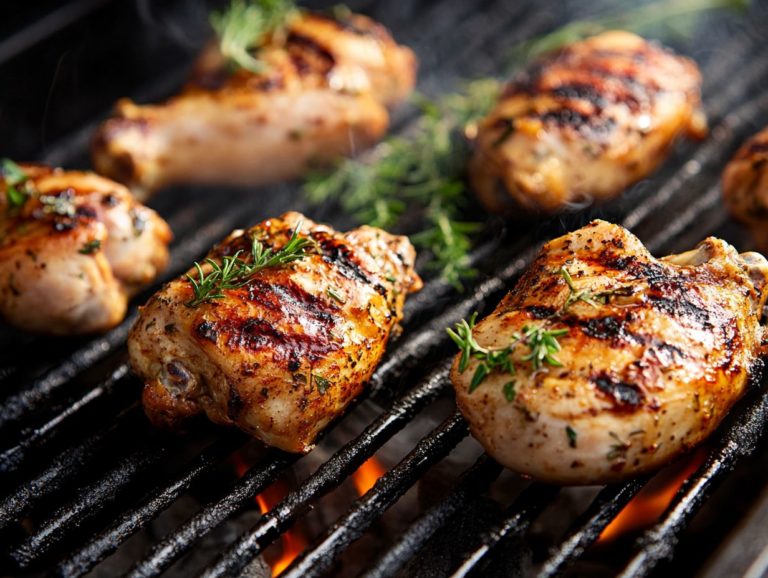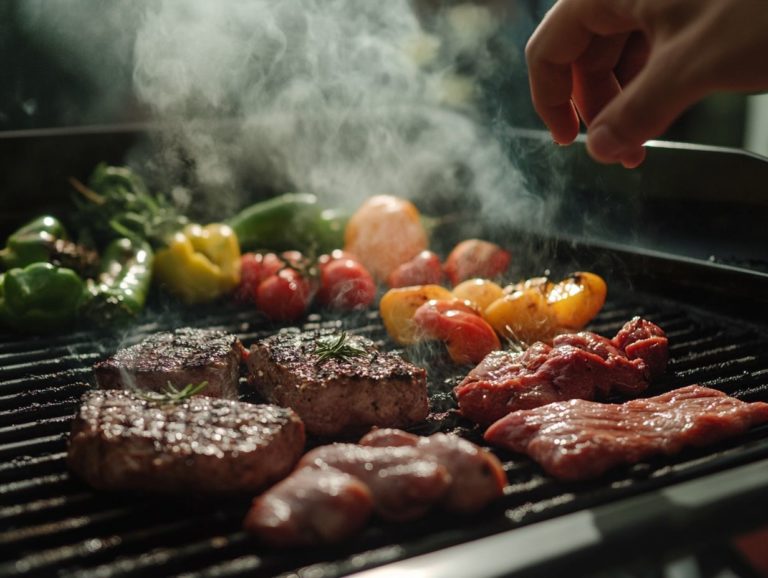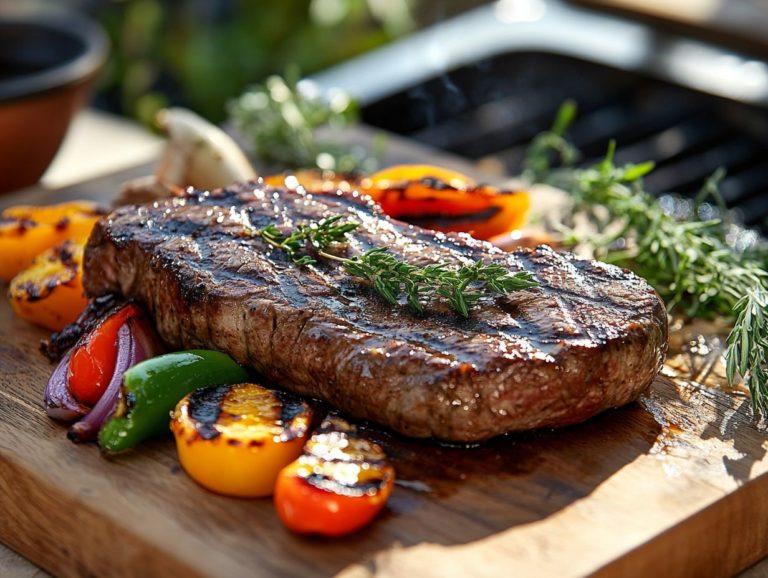Gas vs. Charcoal Grills: Which is Better?
When it comes to grilling, are you torn between the convenience of gas and the rich flavors of charcoal? The debate is as heated as a perfectly seared steak! Each choice presents a unique blend of advantages and drawbacks, ranging from convenience and cost to flavor and cooking techniques.
This article delves into the essential pros and cons of both gas and charcoal grills. It also guides you through vital factors to consider when making your selection, shares tips for safe and effective grilling, and helps you discover which option aligns best with your grilling style.
Whether you re a seasoned pitmaster or just starting out in the backyard, you ll uncover valuable insights that will transform your grilling experience!
Contents
- Key Takeaways:
- Pros and Cons of Gas Grills
- Advantages and Disadvantages of Gas and Charcoal Grills
- Factors to Consider When Choosing Between Gas and Charcoal Grills
- Tips for Using Gas and Charcoal Grills
- Which Grill is Better for You?
- Frequently Asked Questions
- What are the main differences between gas and charcoal grills?
- Which type of grill is better for beginners?
- Which type of grill produces a smokier flavor?
- Are gas grills more expensive than charcoal grills?
- Which type of grill is better for outdoor cooking?
- Is one type of grill more environmentally friendly than the other?
Key Takeaways:
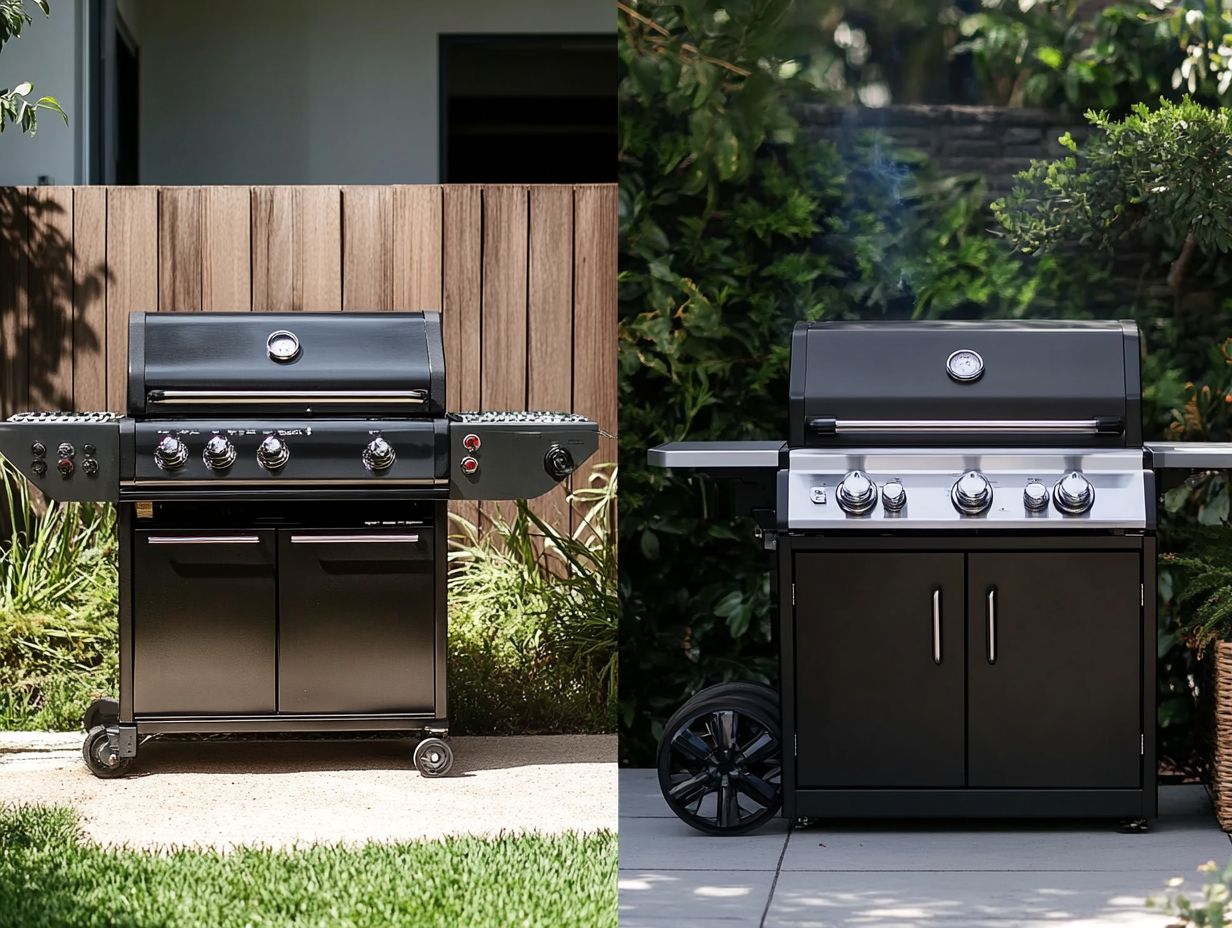
- Gas grills offer convenience and quick cooking, but miss out on charcoal’s smoky flavor.
- Charcoal grills provide excellent flavor and versatility but require more time and effort.
- Consider your budget, flavor preference, and convenience when choosing your grill type.
Overview and Differences
Grilling is a cherished culinary art form you can explore through various methods, with gas grills and charcoal grills standing out as the two primary options. Each of these methods has its own unique traits, flavor profiles, and advantages that appeal to outdoor cooking enthusiasts like you.
Gas grills, often equipped with handy temperature controls (settings to adjust heat), offer ease of use and swift cooking times. In contrast, charcoal grills are celebrated for imparting that signature smoky flavor that many barbecue lovers hold dear. Understanding these differences is crucial as you select the grill that aligns with your cooking style and preferences.
When weighing your options, consider not just the ignition systems gas grills ignite with a simple knob turn, while charcoal requires a bit more finesse to light but also the cooking temperatures you can achieve. For instance, high-end models like the Weber Genesis provide consistent heat and even cooking, ideal for those who value convenience. On the other hand, charcoal grills from brands such as Napoleon offer the versatility to reach a range of temperatures, making them perfect for both slow cooking and searing meats.
Ultimately, your choice will depend on your personal taste, the grilling experience you desire, and whether you value the flavor-packed steam of charcoal grilling over the ease of use offered by gas grills.
Pros and Cons of Gas Grills
Gas grills have gained remarkable popularity among outdoor cooking aficionados, thanks to their convenience and intuitive features. They present an outstanding option for quick and efficient grilling sessions.
With propane tanks (portable gas tanks) or natural gas connections (fixed gas lines), you can enjoy precise temperature control, allowing you to reach the ideal cooking temperature without the fuss of charcoal preparation. The easy clean-up with gas grills makes them especially appealing for busy families or anyone who values a seamless barbecue affair.
Advantages and Disadvantages of Gas and Charcoal Grills
When considering grills, it’s crucial to weigh their advantages and disadvantages to make an informed choice that aligns with your grilling needs. One standout benefit of gas grills is their remarkable ease of use; you can ignite them quickly and enjoy precise temperature control, greatly reducing cooking time.
While convenience is a significant perk, some grilling enthusiasts argue that gas grills may lack the robust charcoal flavor many barbecue lovers crave. This is a key factor to ponder as you select the perfect grill. Plus, their user-friendliness, gas grills often boast multiple burners, allowing you to prepare different dishes simultaneously ideal for hosting gatherings or family events. This versatility can truly transform your cooking experience, especially if you enjoy multitasking in the kitchen.
However, you should also consider the reliance on propane or natural gas, which raises concerns about fuel availability and costs. There’s also the argument that charcoal grills impart a richer, smokier flavor that some find irreplaceable. Ultimately, it s about striking that perfect balance between convenience and flavor, enhancing your overall grilling adventure.
Charcoal grills hold a cherished place among grilling aficionados, celebrated for imparting that beloved smoky flavor and genuine barbecue experience that many seek. If you value taste above all else, charcoal grilling can be a thoroughly enjoyable and rewarding culinary journey. It elevates dishes like barbecue chicken, steak, and ribs to new heights.
This method does demand a greater investment of time and effort. From lighting charcoal briquettes to keeping the heat steady and tackling the post-cook cleanup, it requires your attention. It s essential to weigh these aspects, as they can influence your budget considerations.
The advantages of charcoal grills primarily reside in their ability to infuse grilled foods with a rich, smoky flavor that many enthusiasts consider unparalleled compared to gas grills. However, this exquisite flavor comes with trade-offs: expect longer cooking times and a steeper learning curve in maintaining the desired cooking temperature. These challenges might dissuade some casual grillers.
For those who truly embrace the outdoors and view grilling as a cherished ritual, the process becomes an integral part of the culinary experience. Charcoal grilling demands patience, yet for many, this investment of time culminates in food that not only bursts with character but also pays homage to the artistry of traditional barbecuing.
While the deep, complex flavors are undeniably alluring, the hurdles of achieving consistent cooking temperatures and managing ash cleanup are hard to ignore. As you weigh the pros and cons, you may find yourself navigating the balance between seeking that perfect char and considering the practicalities of convenience and maintenance.
Factors to Consider When Choosing Between Gas and Charcoal Grills
When choosing between gas and charcoal grills, often referred to as charcoal vs gas, several key factors can profoundly influence your grilling experience and overall satisfaction. Budget considerations are often front and center, as both types of grills come with a range of prices depending on features and respected brands like Weber or Char-Broil.
Convenience is also major, especially for those with busy lifestyles who need quick and hassle-free grilling sessions. Finally, don t underestimate the impact of flavor preferences; the choice between charcoal and gas can significantly affect the deliciousness of your barbecue creations, especially when considering the rich charcoal flavor.
Whichever you choose, let your grilling journey begin!
Budget, Convenience, and Flavor
When you re evaluating your grilling options, budget, convenience, and flavor emerge as crucial factors that can significantly influence your decision. It’s essential to know how these elements align with your personal preferences.
For instance, if you’re on a tight budget, you might lean toward charcoal grills, which typically come with a lower upfront cost compared to gas grills. However, keep in mind the long-term expenses associated with fuel.
If convenience is your priority, gas grills might be the way to go; they re celebrated for their quick setup and ease of use, especially when time is of the essence.
On the flip side, if you re a flavor enthusiast, you ll likely find yourself drawn to charcoal grilling, relishing that rich, smoky taste that elevates your backyard barbecues.
Ultimately, grasping these factors will help you ensure a satisfying grilling experience tailored to your diverse needs, whether you prefer the precision of gas or the tradition of charcoal grilling.
Tips for Using Gas and Charcoal Grills
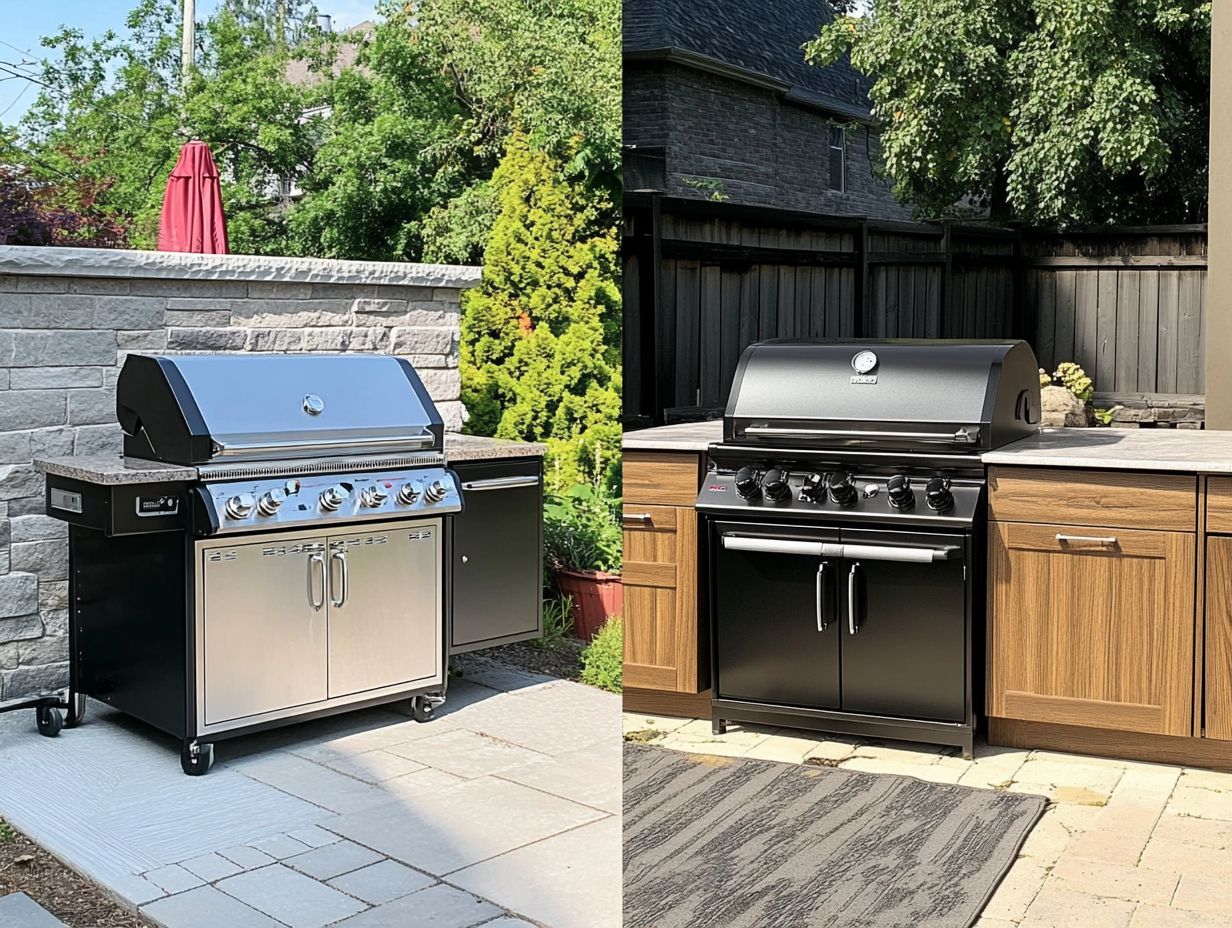
You can maximize your grilling experience with gas or charcoal. This relies on best practices and safety precautions that guarantee both delicious results and a secure cooking environment.
Employing the right grilling tools like a dependable grill brush for cleaning and suitable cooking utensils is crucial for maintaining your grill. This enhances your cooking process and ensures the safety of your outdoor cooking area.
In an outdoor cooking area setting, applying these principles allows you to refine your technique and elevate your barbecue skills, no matter which grill type you select.
Best Practices and Safety Precautions
Implementing best practices and safety precautions when using gas and charcoal grills can significantly elevate your grilling experience while ensuring safety for everyone involved. For gas grills, it’s essential to check the propane tank and ignition system before each cooking session to prevent any malfunctions or accidents.
Charcoal grilling requires careful handling of briquettes small, compressed blocks of charcoal used for grilling and adequate ventilation to avoid overheating or flare-ups. Following these guidelines will help you create a delicious barbecue while prioritizing safety.
Maximizing your enjoyment goes beyond just firing up the grill; it’s about being mindful of essential safety measures. Inspecting propane connections for leaks and using soapy water as a leak test can help you sidestep hazardous situations.
For those who prefer charcoal, making sure the coals are fully lit before you start cooking is vital for even heating and reducing smoke inhalation risks. Having a fire extinguisher on hand is a smart move, and it s best to avoid grilling in enclosed spaces to steer clear of carbon monoxide dangers.
By following these practices, you contribute to a safer and more enjoyable grilling atmosphere, allowing everyone to focus on savoring the expertly crafted flavors.
Which Grill is Better for You?
Determining the best grill for you hinges on your personal preferences, cooking style, and the results you seek from your grilling endeavors.
If you value convenience and swift cooking times, a gas grill may be your perfect match, delivering a seamless experience without sacrificing much on flavor.
On the other hand, if you’re dedicated to infusing your barbecue chicken, steak, or ribs with a robust, smoky taste, the rich flavors of charcoal grilling might resonate more with your culinary ambitions.
Think about what you need, and it will help you choose the right grill.
Now that you know the best practices, get out there and fire up the grill!
Personal Preferences and Recommendations
Personal preferences significantly shape your choice of the best grill for your cooking needs, including everything from the flavors you crave to the convenience you desire. If you find yourself drawn to traditional methods and the distinctive taste of charcoal, a charcoal grill may be your go-to option.
Alternatively, if ease of use and quick setup are more your style, gas grills could be the perfect fit. You ll want to explore what fits your lifestyle, available grilling tools, and culinary aspirations!
For example, if your family juggles busy schedules, an electric grill may offer the convenience you need, allowing for quick weeknight meals without the fuss of charcoal or propane. On the flip side, if you re an enthusiast craving deep, smoky barbecue flavor, offset smokers which use indirect heat to infuse smoke and pellet grills which feed wood pellets for flavor might capture your interest, merging traditional techniques with modern flair.
Recognizing whether your priorities lean toward versatility, portability, or specific cooking styles can profoundly impact your final decision. By thoughtfully assessing your cooking goals and lifestyle, you can carve a path to a more fulfilling and enjoyable grilling experience. Start grilling today and enjoy the flavors you love!
Frequently Asked Questions
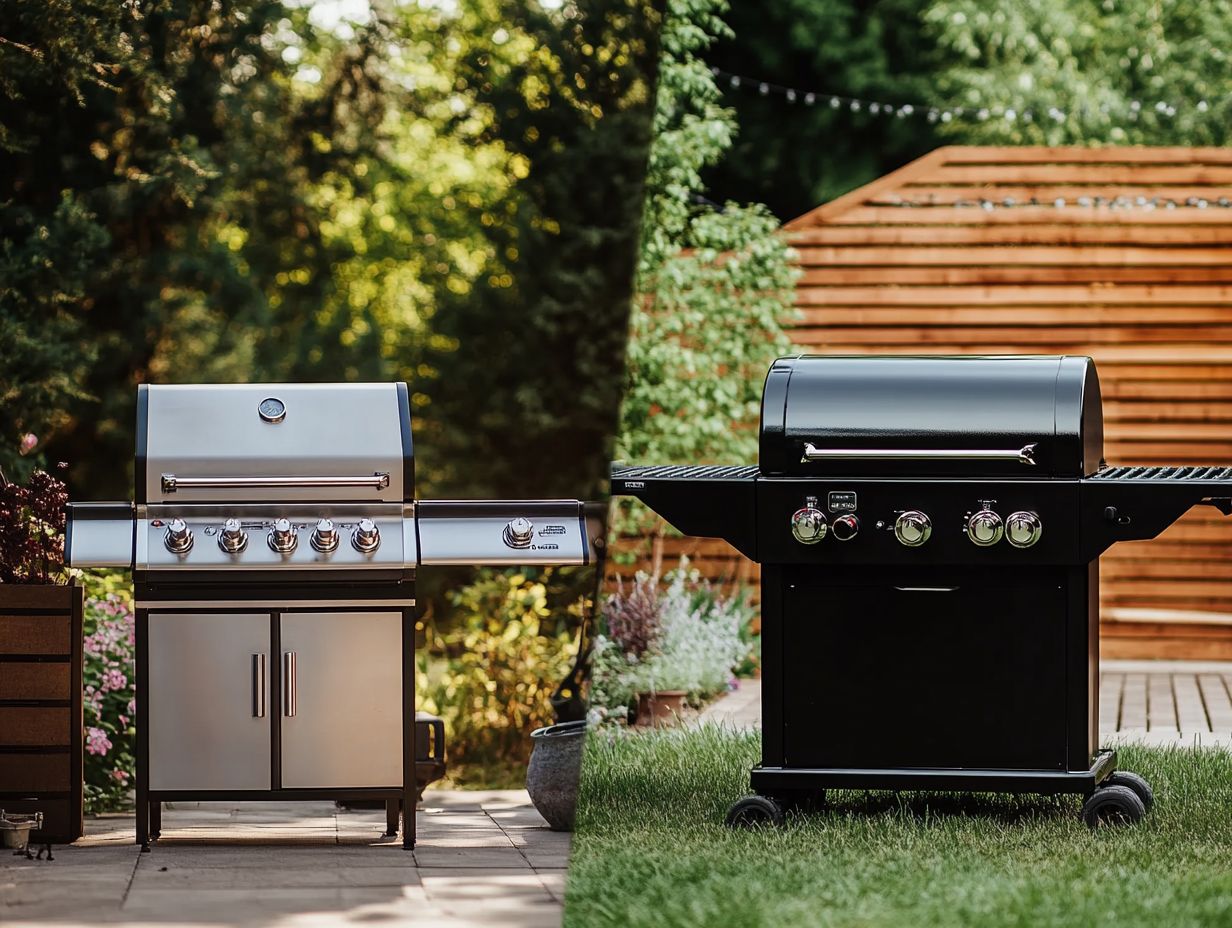
What are the main differences between gas and charcoal grills?
Gas grills are powered by propane or natural gas, while charcoal grills use charcoal briquettes or lump charcoal for heat.
Which type of grill is better for beginners?
Gas grills are often considered easier for beginners to use, as they require less time to heat up and have more precise temperature control.
Which type of grill produces a smokier flavor?
Charcoal grills are known for producing a smokier flavor, as the charcoal gives off more smoke than gas. However, some gas grills come with a smoker box for added smokiness.
Are gas grills more expensive than charcoal grills?
In general, gas grills tend to be more expensive than charcoal grills. However, there are high-end charcoal grills that can be just as expensive as gas grills.
Which type of grill is better for outdoor cooking?
Both gas and charcoal grills can be great for outdoor cooking, but gas grills are often more convenient as they can be used in any weather and have a quicker cleanup process.
Is one type of grill more environmentally friendly than the other?
Charcoal grills are often considered to be more environmentally friendly, as they produce less carbon emissions compared to gas grills. However, gas grills can be more efficient in terms of fuel usage.

